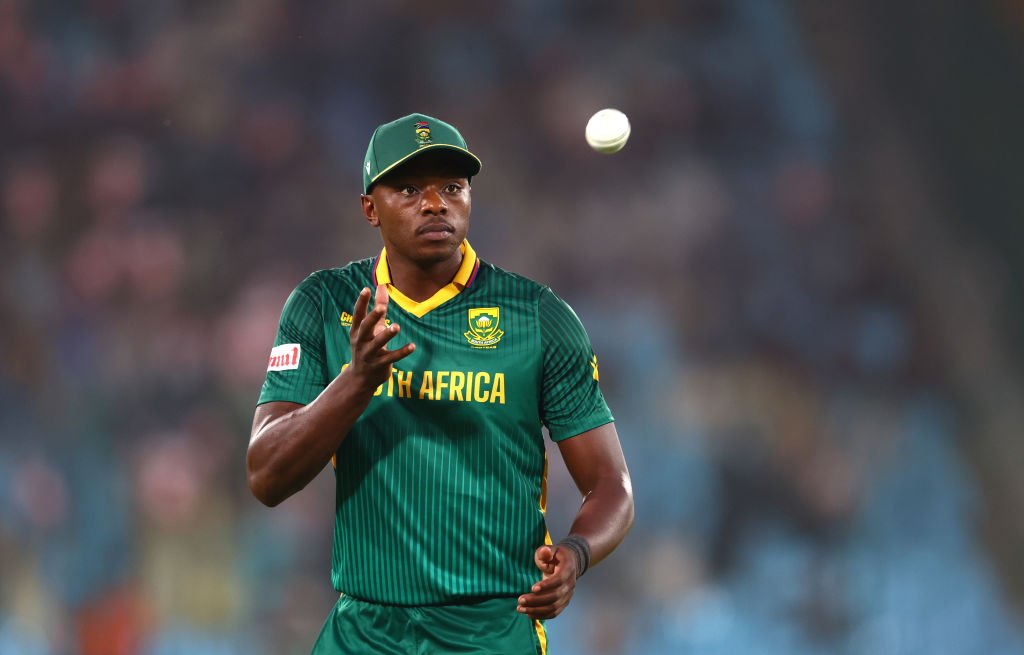
In the high-stakes arena of the ICC Champions Trophy 2025, emotions often run high, leading to moments that captivate fans worldwide. One such incident occurred during the group stage match between South Africa and Afghanistan at the National Stadium in Karachi, where South African pacer Kagiso Rabada delivered a fiery send-off to Afghan opener Ibrahim Zadran after dismantling his stumps.
The match saw South Africa setting a formidable target of 316 runs, thanks to Ryan Rickelton’s maiden ODI century. As Afghanistan commenced their chase, the onus was on their openers to provide a solid foundation. Ibrahim Zadran, known for his resilience, faced the challenge head-on.
Rabada, introduced into the attack in the eighth over, immediately showcased his intent. His initial deliveries to Zadran were probing, with one particular ball beating the inside edge, narrowly missing the stumps. Zadran, undeterred, capitalized on an overpitched delivery in the 10th over, launching a majestic six over long-on, signaling his aggressive approach.
However, Rabada’s response was swift and decisive. On the very next delivery, he increased his pace, delivering a ball clocked at 148.8 km/h, making it the second-fastest wicket-taking delivery in Champions Trophy history. Zadran, attempting to create room for an off-side shot, misjudged the length and pace, resulting in the ball crashing into his middle stump. The sight of the uprooted stump was a testament to Rabada’s sheer speed and precision.
The intensity of the moment was palpable. Rabada, fueled by adrenaline, directed a fierce verbal send-off towards Zadran, a gesture that underscored the competitive spirit prevalent in such high-profile tournaments. While some purists advocate for restrained celebrations, instances like these highlight the raw passion and commitment players bring to the game.
This duel between Rabada and Zadran became a focal point of the match. It exemplified the classic bowler-batsman confrontation, where strategies are crafted and countered in a matter of deliveries. Zadran’s audacious six showcased his confidence, but Rabada’s immediate retaliation emphasized the importance of adaptability and resilience in cricket.
Beyond this fiery exchange, Kagiso Rabada’s overall performance was instrumental in South Africa’s comprehensive 107-run victory. Finishing with figures of 3 for 36, he consistently troubled the Afghan batsmen, ensuring regular breakthroughs that stifled their chase. His partnership with fellow bowlers, notably Wiaan Mulder, who chipped in with 2 for 36, ensured that Afghanistan was bundled out for 208 runs.
Reflecting on the broader implications, such moments of intensity can serve dual purposes. For the bowling side, it reinforces dominance and can psychologically unsettle the opposition. Conversely, for the batting team, it can act as a rallying point, motivating them to counter with renewed vigor. In this instance, South Africa capitalized on the momentum, maintaining pressure on Afghanistan throughout their innings.
For fans and cricket enthusiasts, these fiery exchanges add a layer of excitement and narrative to the game. They remind audiences of the human element inherent in sports, where emotions, strategy, and skill intertwine to produce unforgettable moments. Rabada’s send-off to Zadran will undoubtedly be replayed and discussed, serving as a highlight of the tournament and a testament to the fierce competitiveness that defines the ICC Champions Trophy.
In conclusion, while cricket is celebrated for its gentlemanly conduct, the sport’s evolution has embraced the passionate displays of its players. Kagiso Rabada’s fiery send-off to Ibrahim Zadran encapsulates the intensity and fervor of modern-day cricket, where every ball is a battle, and every wicket is a victory not just of skill, but of spirit.

